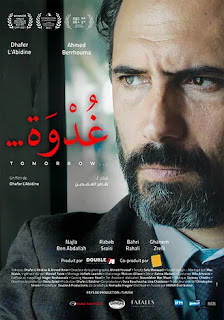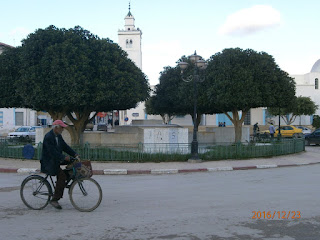Ghodwa by Dhafer L'abidin
Tomorrow
(Ghodwa)
Film by Dhafer L’abidin
Film cover
Ps. The
title Ghodwa translates as “tomorrow’ in
English
Tunisian acting star Dhafer L’Abidine is making
his directorial debut with father and son drama Ghodwa, which he also
produces and stars in.
Directed by
Dhafer L’abidin
He has produced Ghodwa under the banner of his company
Double A, in collaboration with Tunisian producer Dora Bouchoucha at
Tunis-based Nomadis Images and Alaa Karkouti and Maher Diab at Egypt’s Mad
Solutions.
L’abidin co-writes the
screenplay in collaboration with Egyptian filmmaker and writer Ahmed Amer,
whose writing credits include the political drama Winter Of
Discontent and festival hit Ali, The Goat And Ibrahim.
Genre: art
house movie, drama, satire
An Art house movie (cinema d’auteur) is a film that is
intended to be a serious artistic work rather than a piece of popular
entertainment.
Ghodwa is a typical art
house movie. The audience which is looking for an entertaining film is not
going to find its piece of cake in this movie.
Synopsis:
The film revolves around an alienated and
disillusioned father and a son who live together in an apartment in Tunis. The
father falls ill. With time running out, a series of unexpected events reverse
their traditional roles.
Plot
The film opens up with
a man in the street of Habib Bourguiba running from two men. The intense of
actions calm down in the toilet. Feeling more secure only when he closes the
door of his house with a lot of blocs then going to his plants and watering
them. While overwhelmed with his intense
feelings, someone knocks on the door. It is his son Ahmed. He returns from the
school. Sitting on the dining table, they start a father son conversation. They
ask each other about their days. This scene ends with many questions in the
eyes of the son that are not answered.
The scene of the
Tunisian news on TV has triggered the fears of the father leading him to the
toilet where he keeps repeating the big three: reality, equality, and then
reconciliation. It is only after 20 minutes that we know the name of the main
character si Lahbib ben Amor, a human rights lawyer. After that, the camera
takes us to the metro when si Lahbib sits looking at every single detail in the
street.
Tomorrow, he will go to
a psychiatric hospital and Saadia, his friend comes to visit him. They drink
tea together. It is only when Ahmed comes that we realize from his reaction
that Saadia does not exist. She is created by Lahbib.
Characters
Si Lahbib ben Amor: Human Rights lawyer.
An overthinking person who cares about others' issues. He is awkward, bizarre and sometimes mad.
He creates a parallel world to evade from reality which is haunting him. At this level that we can realize that the two men who are chasing him at the beginning of the film is a fiction and not a reality.
Lamia: Lahbib's ex wife.
Ahmad: his son.
Saadia: his friend
Hechem: his neighbour.
Themes
Reconciliation:
Corruption in Tunisia
Regionalism inequality
Economic disparity
Scenes' Analysis
The opening scene showing the protagonist running from unknown men in the streets of Tunis reminds us of Will Smith's The Pursuit of Happiness. From whom is he running ? is he going to reach a safe place?
The second scene launches when Ahmed returns home and both start to ask each other questions about their days.
The rythm of the film can be felt flat as there are no many actions and for some audience, this can be boring.
The third scene takes us to the living room where the news on TV is talking about the Tunisian situation governed by the high price of goods. Such scene has urged Lahbib to keep murmuring;
" الحقيقة والعدالة ثم المصالحة which means "reality, justice and reconciliation"
لم تحقق العدالة بعد" justice is not applied, yet."
Movie sound effect
Even though the dialogue in the film is not very rich, the sound effect has taken its place in many occasions. Si lahbib does not talk so much in the movie and even if he says something, it is not clear enough to be understood by the audience. The background effects grow bigger throughout the film following the steps of si Lahbib to make us step inside the mind of the character.
According to those effects, we can understand the extent to
which he is irritated by the external world. You can be annoyed by the big
noise which is made in purpose to evoke the disillusion and the alienation of
the character. The movie maker surfs inside the inner world of si Lahbib to
draw a bigger image of the Tunisian youth reality. Such image is governed by a
lack of trust, irritation, and lack of faith in the future. Tunisian young
people have lost their faith in their country which pushes them to seek refuge in
other lands like Italy which is the number one destination of all youngsters.
Film director’s impressions:
“I always wanted to
direct, but I wanted to find the right story. Ghodwa is a story that is very close to
my heart, and that I feel strongly about. It’s a Tunisian story, but its social
and human aspects have universal appeal,” said L’Abidine.
Who is Dhafer
L’abidin?
photo credit: Jeune Afrique
Tunisian born, he has undergone an English acting training at the
UK’s Birmingham School of Acting and begun his career in TV dramas such
as Dream Team, Spooks, Casualty, The Bill,
before returning to Tunisia, his native land where he won fame for his roles in
popular shows such as Destiny (Maktoub)
He now enjoys an international career
with recent credits ranging from Netflix’s French-speaking serial drama The
Eddy to Arabic-language vampire horror feature Bloodline and romantic drama Bride of Beirut




Comments
Post a Comment